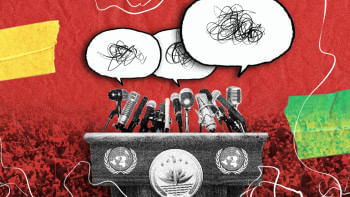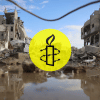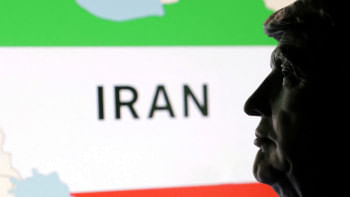We must raise our voice against injustice everywhere at once

It's ironic that the 75th anniversary of two international instruments—the Universal Declaration of Human Rights (UDHR) and the UN Genocide Convention—is being observed when the world is witnessing the killing spree on and forced displacement of Palestinians via Israel's military operation. This is the worst attack on Palestinians since the one that took place during the creation of the Jewish state, which Palestinians call Nakba (or, catastrophe). The creation of Israel resulted in the expulsion of at least 750,000 Palestinians from their homes and 78 percent of historic Palestine being overtaken. The remaining 22 percent was divided into what are now the occupied West Bank and the besieged Gaza Strip. After 75 years, it's being feared that now, three times more Palestinians will be driven out from Gaza.
The human rights declaration was approved by the UN General Assembly on December 10, 1948, a day after the Genocide Convention (the first human rights treaty) was adopted by the UNGA. Both these instruments signified the international community's commitment to "never again" allow the atrocities committed during the Second World War to be replicated. But witnessing the atrocities unleashed on Palestinian civilians at present, who can believe in the existence of any such commitment?
It is especially depressing to see that the two major world powers—the United States and the United Kingdom—still refuse to vote for a ceasefire and end this mass slaughter, despite the fact that Israel's response to Hamas' October 7 attack is hugely disproportionate and one-sided. Israel's response has been described by UN Secretary General Antonio Guterres as a "humanitarian nightmare [that] has engulfed the people of Gaza." Yet, the two main backers of Israel continue to repeat the mantra of its "right to self-defence"—countering Gueterres' assertion that "the brutality perpetrated by Hamas can never justify the collective punishment of the Palestinian people."
Our constitution has given us guarantees on quite a few fundamental rights and entrusted the judiciary—the Supreme Court in particular—to enforce them. There's no denying that, over its 53-year journey, our top court has set some exemplary precedences. However, a significant shift in recent years has raised considerable concerns among jurists about whether citizens are receiving the court's protection as they deserve it under the constitution.
Supporters of the ruling party try to discredit those of us who raise concerns about the appalling rights abuses in Bangladesh, alleging that we don't speak out about Palestinians' rights. Similar baseless allegations are also made against global rights groups. But the duties of a human rights defender include protesting injustice and abuse taking place anywhere in the world—be it by a major global power or by a national authority—and advocating for the protection of all irrespective of their race, religion, and nationality. Which is why speaking out against domestic human rights abuses cannot and should not wait until all other global injustices have been addressed. Rather, establishing rights at home can further embolden our resolve for global justice.
Looking back at Bangladesh's own increasingly alarming rights situation, we need to find an answer to the question of the rule of law. Our constitution has given us guarantees on quite a few fundamental rights and entrusted the judiciary—the Supreme Court in particular—to enforce them. There's no denying that, over its 53-year journey, our top court has set some exemplary precedences. However, a significant shift in recent years has raised considerable concerns among jurists about whether citizens are receiving the court's protection as they deserve it under the constitution.
At a scholarly seminar on a recently published book by Routledge, titled A History of the Constitution of Bangladesh, held at the School of Oriental and African Studies (SOAS) of the University of London, quite a few jurists expressed their concerns regarding the politicisation of the judiciary and its lack of independence. Citing examples such as the year-and-a-half detention of Jagannath University student Khadijatul Kubra on charges under the controversial Digital Security Act, they opined that instead of ensuring her right to freedom of speech, the court had aided the executive authority to unnecessarily prolong her detention.
Another example cited was a decision by a High Court bench on a so-called public interest litigation seeking a ban on an Al Jazeera documentary titled "All the Prime Minister's Men," in which the court dismissed the petition on the ground of petitioners' lack of locus standi. However, it did issue a suo moto rule as "sons of the soil" and banned it. The speakers concluded that such a gag order on the media was not only unprecedented, but against the spirit of Bangladesh's constitution.
Along this thread, one may wonder: where does the standard of enforcing fundamental rights stand when a top opposition politician—who is unlikely to be a flight risk—has been denied bail despite numerous precedents of allowing bail to politicians charged with serious offences? The highest court's inaction and apparent reluctance to enforce its own directives about remand and torture is another aspect which risks eroding our confidence in our legal system.
The stacks of arrests of opposition activists on spurious and fictitious charges; the unusual speed and number of trials of opposition politicians; and the lack of judicial intervention regarding the inhumane behaviour of law enforcement officials towards detainees (including keeping fetters on while the latter performed the last rites of close family members, or were undergoing treatment), raise doubts among the citizenry regarding the value of constitutional guarantees. Our judiciary needs to be proactive in its responsibility of "advancing freedom, equality, and justice for all," Otherwise, it's unlikely that the downward slide in Bangladesh's human rights situation will improve anytime soon.
Kamal Ahmed is an independent journalist. His X handle is @ahmedka1
Views expressed in this article are the author's own.
Follow The Daily Star Opinion on Facebook for the latest opinions, commentaries and analyses by experts and professionals. To contribute your article or letter to The Daily Star Opinion, see our guidelines for submission.

 For all latest news, follow The Daily Star's Google News channel.
For all latest news, follow The Daily Star's Google News channel. 










Comments